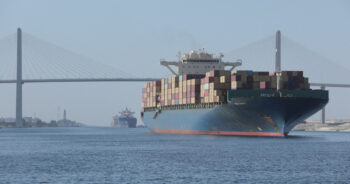 An unrelenting disruption in the Red Sea could significantly affect India’s foreign trade, according to India Ratings and Research (Ind-Ra), which recently noted that the working capital cycle of companies is likely to aggravate by 15-20 days, and the impact could be stronger for sectors like agriculture and textiles.
An unrelenting disruption in the Red Sea could significantly affect India’s foreign trade, according to India Ratings and Research (Ind-Ra), which recently noted that the working capital cycle of companies is likely to aggravate by 15-20 days, and the impact could be stronger for sectors like agriculture and textiles.
The impact is likely to raise the share of freight and forwarding (F&F) cost in the total cost by 25-30 percent for companies involved in international trade, it said in a note.
Pressures on cash flow, although moderate for large entities, will further increase borrowings for several sectors, including chemicals and textiles, which have seen a year-on-year (YoY) rise in net leverage in the first half of fiscal 2023-24 (FY24).
“The challenge is significant for the entities having low value addition therefore thin margins. Although large entities have adequate elbow room to accommodate such incremental cost, delays and disruptions in supply chains will be key factors to watch for. For medium-sized entities, the challenge is two-fold, both cost and supply and consequently working capital cycle. These entities have not benefitted much from the softening of commodity prices, as free cash flow has remained sluggish for most of them”, said Soumyajit Niyogi, Director, core analytical group, Ind-Ra.
The initial reaction can be seen in freight rates rising by 150 percent in the past 45 days.
The Red Sea route constituted 40 percent of the total oil imports and 24 percent of the total exports during April to October 2023.
Between 20 to 25 percent of India’s foreign trade logistics is through the Suez Canal, and key sectors like crude oil, chemicals and textiles are being affected, noted Ind-Ra.
Indian exports are facing higher shipping costs due to rerouting, leading to reduced export volumes, affecting small and medium enterprises (SMEs) dealing with a high volume of low-value products. Higher shipping costs due to the rerouting erode profit margins, making Indian exports less competitive. A sustained crisis could start impacting liquidity and credit condition of borrowers, it said. The credit profile of SMEs involved in foreign trade might face additional liquidity pressure owing to an elongation of the working capital cycle.
An elongation of the working capital cycle along with lower cash flow generation may increase the reliance on external sources of funding at higher rates, thus putting pressure on their financial risk profiles.
 An unrelenting disruption in the Red Sea could significantly affect India’s foreign trade, according to India Ratings and Research (Ind-Ra), which recently noted that the working capital cycle of companies is likely to aggravate by 15-20 days, and the impact could be stronger for sectors like agriculture and textiles.
An unrelenting disruption in the Red Sea could significantly affect India’s foreign trade, according to India Ratings and Research (Ind-Ra), which recently noted that the working capital cycle of companies is likely to aggravate by 15-20 days, and the impact could be stronger for sectors like agriculture and textiles.

















